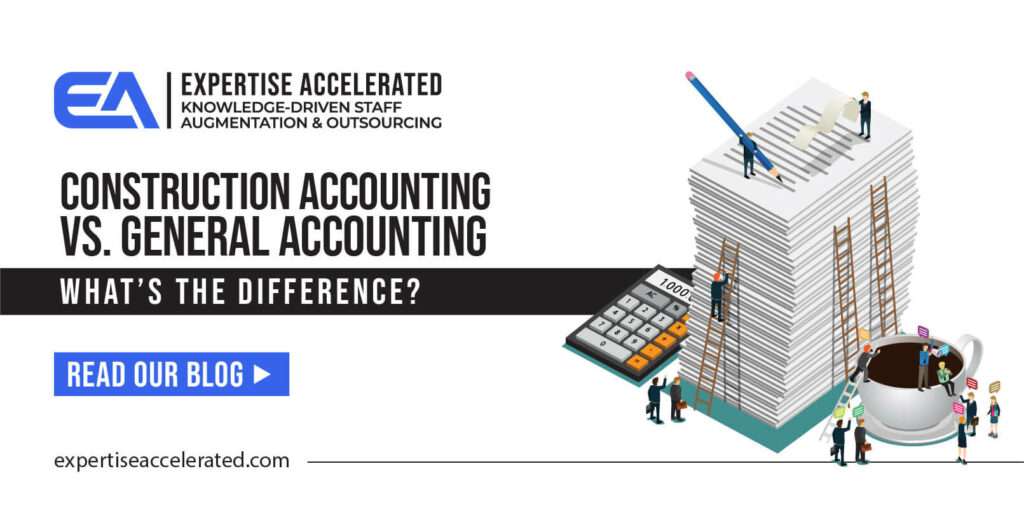The Benefits of Hiring Experts in Construction Accounting for Your Business
The Benefits of Hiring Experts in Construction Accounting for Your Business
Blog Article
Recognizing the Value of Building Audit for Successful Task Monitoring

Function of Building And Construction Bookkeeping
Building and construction bookkeeping works as the foundation of financial administration in the building and construction industry, making sure that tasks are finished within budget and financial goals are fulfilled. construction accounting. This customized bookkeeping method addresses the distinct obstacles faced in building tasks, consisting of differing task periods, varying expenses, and several stakeholders
One of the main functions of building accountancy is to supply exact expense evaluation and tracking throughout the project lifecycle. This assists in enlightened decision-making, making it possible for job supervisors to readjust resources and timelines efficiently. In addition, building and construction audit boosts cash flow management by keeping an eye on accounts receivable and payable, thus guaranteeing that funds are offered for timely payments to subcontractors and distributors.
It equips task managers with the required financial data to prepare thorough financial statements, which are important for audits and economic testimonials. Ultimately, the duty of building audit extends beyond plain financial monitoring; it is indispensable to tactical planning and operational efficiency, driving the success of construction tasks in a competitive landscape.
Trick Elements of Building Accountancy

Budgeting develops a monetary framework that overviews task implementation, enabling managers to allot sources efficiently and prepare for possible financial challenges. Accurate price tracking is essential for monitoring expenses in real-time, assisting to identify differences between predicted and real expenses. This makes it possible for timely adjustments to maintain the task on spending plan.
Additionally, financial coverage provides stakeholders with a clear photo of the job's financial wellness. Regular reports, such as revenue and loss statements and money flow analyses, promote informed decision-making and boost transparency among all events included.
Additionally, compliance with sector guidelines and accounting criteria is critical. This makes sure that economic practices are not just efficient yet also legal, guarding the organization versus lawful repercussions. By integrating these crucial components, building and construction accounting promotes an organized method to handling funds, ultimately adding to the effective completion of building jobs.
Benefits for Project Managers
Leveraging efficient building and construction accounting practices supplies project managers with a wide range of advantages that improve both operational effectiveness and financial oversight. One considerable advantage is boosted spending plan administration. Accurate monitoring of revenues and costs allows task supervisors to monitor financial performance in genuine time, ensuring tasks stay within budget and promoting prompt adjustments when required.
Additionally, building accounting streamlines cash money circulation management, allowing task managers to optimize and expect economic demands source appropriation. By comprehending cash inflows and discharges, they can much better manage repayments to employees, subcontractors, and distributors, therefore preventing expensive hold-ups.
In addition, durable accountancy systems give detailed reporting abilities. Project supervisors can generate reports that offer insights into job productivity, cost differences, and source use. This data-driven strategy cultivates informed decision-making, allowing managers to determine possible concerns proactively and carry out rehabilitative steps.
Finally, adherence to building accountancy requirements ensures conformity with legal and regulatory needs, lessening the danger of charges or disagreements. In general, effective building bookkeeping gears up job supervisors with the tools needed to drive job success, improve stakeholder self-confidence, and promote long-lasting organizational growth.
Usual Challenges in Building And Construction Accountancy
Numerous task supervisors encounter substantial challenges in construction bookkeeping that can prevent job success. Among the key obstacles is the complexity of tracking several task websites, each with unique budgets, timelines, and resource allocations. This needs thorough interest to information, which can be overwhelming without a durable audit system in location.
Furthermore, fluctuating material expenses and labor prices can complicate budget plan monitoring, making accurate projecting challenging. Task supervisors usually battle to integrate these prices with actual expenditures, bring about possible financial inconsistencies.
Furthermore, building and construction audit entails conformity with various guidelines, consisting of tax obligations and labor laws. Navigating these policies can be difficult, particularly for managers who may not have a solid accountancy background.
An additional significant challenge is managing capital, which is crucial in the construction sector. Hold-ups in invoicing, settlements from clients, or unforeseen task modifications can produce capital scarcities, threatening the project's progression.
Finally, efficient interaction in between project managers, accounting professionals, and area groups is crucial. Misunderstandings can lead to incorrect financial reporting, further making complex project monitoring efforts. Resolving these challenges Resources proactively is essential for successful building accounting.

Ideal Practices for Effective Accounting
While navigating the intricacies of building audit can be overwhelming, embracing best techniques can dramatically boost monetary management and project success. One fundamental technique is maintaining timely and exact documents. Carrying out robust accountancy software program tailored to construction projects can enhance information access, invoicing, and reporting, decreasing errors and saving time.
Additionally, developing a clear budget and regular surveillance versus this budget are vital. Employing a system of periodic monetary reviews enables job managers to identify differences early, assisting in timely decision-making. It is additionally necessary to different task expenses right into straight and indirect categories, making it possible for clearer insights into success.
An additional finest practice includes promoting open communication among all stakeholders. Normal updates and joint discussions regarding monetary standing can ensure every person is straightened and educated. Training personnel in construction-specific accounting concepts even more improves try this out expertise and precision.
Finally, making certain conformity with appropriate accounting standards and regulations is non-negotiable. Regular audits and internal reviews add to transparency and liability, constructing depend on with customers and stakeholders. By concentrating on these ideal techniques, construction companies can enhance their audit procedures, ultimately driving project success and financial security.
Verdict
In conclusion, building accounting plays a critical role in making certain successful job monitoring by facilitating accurate economic oversight and enhancing decision-making. By integrating key parts such as price estimate, capital administration, and compliance, job supervisors can navigate typical obstacles and utilize best methods for efficient bookkeeping. Inevitably, a durable construction audit framework not just safeguards spending plan integrity yet additionally adds to the general economic health and wellness of construction jobs, cultivating sustainable success within the sector.
By integrating these key parts, construction accountancy cultivates an organized method to taking care of financial sources, ultimately adding to the effective completion of building projects.
Accurate tracking of profits and expenses enables task managers to keep track of economic efficiency in real time, guaranteeing tasks continue to be within budget plan and facilitating timely adjustments when essential.
Job supervisors can create records that use insights right into job productivity, cost useful reference variances, and source usage.Many job managers run into substantial challenges in building audit that can hinder project success. construction accounting. Eventually, a robust construction accountancy structure not just safeguards budget plan honesty however additionally adds to the total financial health of building projects, cultivating sustainable success within the market
Report this page